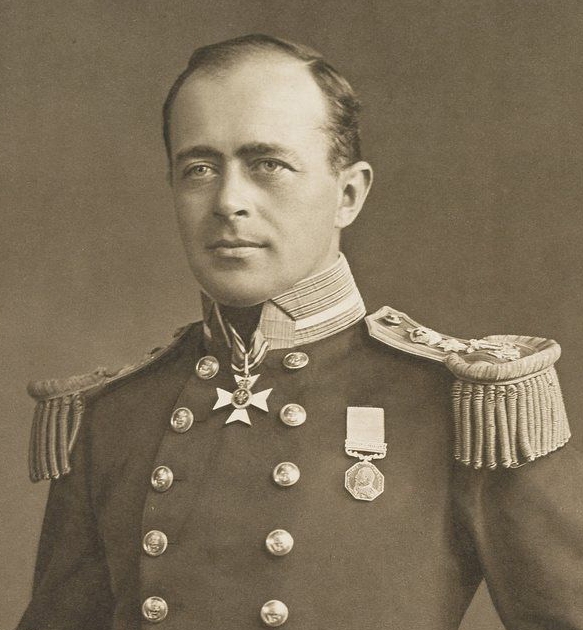Robert Falcon Scott
Captain Robert Falcon Scott, CVO, RN (6 June 1868 – 29 March 1912) was a British Royal Navy officer and explorer who led two expeditions to the Antarctic regions: the Discovery Expedition (1901–1904) and the ill-fated Terra Nova Expedition (1910–1913). On the first expedition, he set a new southern record by marching to latitude 82°S and discovered the Polar (Antarctic) Plateau, on which the South Pole is located. On the second venture, Scott led a party of five which reached the South Pole on 17 January 1912, less than five weeks after Roald Amundsen's Norwegian expedition. On their return journey, Scott's party discovered plant fossils, proving Antarctica was once forested and joined to other continents. A planned meeting with supporting dog teams from the base camp failed, despite Scott's written instructions, and at a distance of 150 miles from their base camp and 11 miles from the next depot, Scott and his companions perished.
Before his appointment to lead the Discovery Expedition, Scott had followed the career of a naval officer in the Royal Navy. In 1899, he had a chance encounter with Sir Clements Markham, the president of the Royal Geographical Society, and thus learned of a planned Antarctic expedition, which he soon volunteered to lead. Having taken this step, his name became inseparably associated with the Antarctic, the field of work to which he remained committed during the final 12 years of his life.
Following the news of his death, Scott became a celebrated hero, a status reflected by memorials erected across the UK. However, in the closing decades of the 20th century, Scott became a figure of controversy, with questions raised about his competence and character. Commentators in the 21st century have regarded Scott more positively after assessing the temperature drop below −40 °C (−40 °F) in March 1912, after re-discovering Scott's written orders of October 1911, in which he had instructed the dog teams to meet and assist him on the return trip.
Early life
Family
Scott was born on 6 June 1868, the third of six children and elder son of John Edward, a brewer and magistrate, and Hannah (née Cuming) Scott of Stoke Damerel, near Devonport. There were also naval and military traditions in the family, Scott's grandfather and four uncles all having served in the army or navy. John Scott's prosperity came from the ownership of a small Plymouth brewery which he had inherited from his father and subsequently sold. Scott's early childhood years were spent in comfort, but some years later, when he was establishing his naval career, the family would suffer serious financial misfortune.
In accordance with the family's tradition, Scott and his younger brother Archie were predestined for careers in the armed services. Scott spent four years at a local day school before being sent to Stubbington House School in Hampshire, a cramming establishment that prepared candidates for the entrance examinations to the naval training ship HMS Britannia at Dartmouth. Having passed these exams Scott began his naval career in 1881, as a 13-year-old cadet.
In March 1888 Scott passed his examinations for sub-lieutenant, with four first class certificates out of five. His career progressed smoothly, with service on various ships and promotion to lieutenant in 1889. In 1891, after a long spell in foreign waters, he applied for the two-year torpedo training course on HMS Vernon, an important career step. He graduated with first class certificates in both the theory and practical examinations. A small blot occurred in the summer of 1893 when, while commanding a torpedo boat, Scott ran it aground, a mishap which earned him a mild rebuke.
In 1894, while serving as torpedo officer on the depot ship HMS Vulcan, Scott learned of the financial calamity that had overtaken his family. John Scott, having sold the brewery and invested the proceeds unwisely, had lost all his capital and was now virtually bankrupt. At the age of 63, and in poor health, he was forced to take a job as a brewery manager and move his family to Shepton Mallet, Somerset. Three years later, while Robert was serving with the Channel squadron flagship HMS Majestic, John Scott died of heart disease, creating a fresh family crisis. Hannah Scott and her two unmarried daughters now relied entirely on the service pay of Scott and the salary of younger brother Archie, who had left the army for a higher-paid post in the colonial service. Archie's own death in the autumn of 1898, after contracting typhoid fever, meant that the whole financial responsibility for the family rested on Scott.
Promotion, and the extra income this would bring, now became a matter of considerable concern to Scott. In the Royal Navy however, opportunities for career advancement were both limited and keenly sought after by ambitious officers. Early in June 1899, while home on leave, he had a chance encounter in a London street with Clements Markham, who was now knighted and President of the Royal Geographical Society (RGS), and learned for the first time of an impending Antarctic expedition with Discovery, under the auspices of the RGS. It was the opportunity for early command and a chance to distinguish himself, rather than any predilection for polar exploration which motivated Scott, according to Crane. What passed between them on this occasion is not recorded, but a few days later, on 11 June, Scott appeared at the Markham residence and volunteered to lead the expedition.
